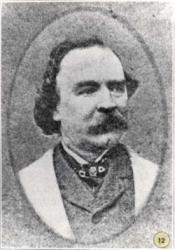
1608 - 1674 Hymnal Number: 6a Author of "Let us, with a gladsome mind" in Esperanta Himnaro Milton, John, was born in London, Dec. 9, 1608, and died there Nov. 8, 1674. His poetical excellences and his literary fame are matters apart from hymnology, and are fully dealt with in numerous memoirs. His influence on English hymn-writing has been very slight, his 19 versions of various Psalms having lain for the most part unused by hymnal compilers. The dates of his paraphrases are:—
Ps. cxiv. and cxxxvi., 1623, when he was 15 years of ago. These were given in his Poems in English and Latin 1645.
Ps. lxxx.-lxxxviii., written in 1648, and published as Nine Psalmes done into Metre, 1645.
Ps. i., 1653; ii., “Done August 8, 1653;" iii., Aug. 9, 1653; iv. Aug. 10, 1653; v., Aug. 12, 1653; vi., Aug. 13, 1653; vii.Aug. 14, 1653; viii., Aug. 14, 1653.
These 19 versions were all included in the 2nd ed. of his Poems in English and Latin, 1673. From these, mainly in the form of centos, the following have come into common use:—
1. Cause us to see Thy goodness, Lord. Ps. lxxxv.
2. Defend the poor and desolate. Ps. lxxxii.
3. God in the great assembly stands. Ps. lxxxii.
4. How lovely are Thy dwellings fair. Ps. lxxxiv. From this, "They pass refreshed the thirsty vale," is taken.
5. Let us with a gladsome [joyful] mind. Ps. cxxxvi.
6. O let us with a joyful mind. Ps. cxxxvi.
7. The Lord will come and not be slow. Ps. lxxxv.
Of these centos Nos. 4 and 5 are in extensive use. The rest are mostly in Unitarian collections. There are also centos from his hymn on the Nativity, "This is the month, and this the happy morn" (q.v.).
--John Julian, Dictionary of Hymnology (1907)
John Milton


 My Starred Hymns
My Starred Hymns





